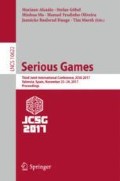Abstract
The paper invites to a reflection on the way energy efficiency (serious) games – i.e. those addressing the issue of behavioral change in individual energy consumption – are and should be designed to better fulfil the goals assigned to Demand Side Management programs, notably run by governments and utilities, with special respect to public buildings (i.e. other than private homes). We introduce three contextual design goals and contend that more can be done to exploit the potential of gamification in the domain at hand.
Access this chapter
Tax calculation will be finalised at checkout
Purchases are for personal use only
References
Brown, M.A., Wolfe, A.K., Bordner, R., Goett, A., Kreitler, V., Moe, R.: Persistence research of DSM impacts: methods, applications, and selected findings. Final report. Electric Power Research Inst., Palo Alto, CA; Oak Ridge National Lab., TN; Synergic Resources Corp., Bala-Cynwyd, PA (1996)
Crossley, D.: International best practice in using energy efficiency and demand management to support electricity networks. Report 4 of the Australian Alliance to Save Energy Research Project: Scaling the Peaks: Demand Management and Electricity Networks (2010)
EEA (European Environment Agency): Achieving energy efficiency through behavior change: what does it take? Technical report No. 5. EEA, Copenhagen (2013)
Grossberg, F., Wolfson, M., Mazur-Stommen, S., Farley, K., Nadel, S.: Gamified Energy Efficiency Programs. ACEE Report No. B1501 (2015)
Halko, S., Kientz, J.A.: Personality and persuasive technology: an exploratory study on health-promoting mobile applications. In: Ploug, T., Hasle, P., Oinas-Kukkonen, H. (eds.) PERSUASIVE 2010. LNCS, vol. 6137, pp. 150–161. Springer, Heidelberg (2010). doi:10.1007/978-3-642-13226-1_16
Lewis, P.E., Dromacque, C., Brennan, S., Stromback, J., Kennedy, D.: Empower Demand 2. Energy Efficiency through Information and Communication Technology – Best Practice Examples and Guidance. VaasaETT Global Energy Think Tank, Helsinki (2012)
Mazur-Stommen, S., Farley, K.: Games for Grownups: The Role of Gamification in Climate Change and Sustainability. Indicia Consulting LLC, USA (2016)
Mengolini, A., Gangale, F., Vasiljevska, J.: Exploring community-oriented approaches in demand side management projects in Europe. Sustainability 8, 1266–1277 (2016)
Oinas-Kukkonen, H., Harjumaa, M.: A systematic framework for designing and evaluating persuasive systems. In: Oinas-Kukkonen, H., Hasle, P., Harjumaa, M., Segerståhl, K., Øhrstrøm, P. (eds.) PERSUASIVE 2008. LNCS, vol. 5033, pp. 164–176. Springer, Heidelberg (2008). doi:10.1007/978-3-540-68504-3_15
Zonta, A.: DSM in a nutshell. In: TOGETHER Project Library. Provincia di Treviso, Italy (2016). http://www.pnec.org.pl/images/stories/TogetherLib/docs/1._DSM_in_a_nutshell.pdf. Accessed 30 Apr 2017
Acknowledgments
This research has been made possible in part by an Interreg Central Europe 2014–2020 grant from the European Commission (project no. 051 – TOGETHER, Lead Partner Provincia di Treviso). However, the opinions expressed in this paper are solely of the authors and do not engage or commit any European institution.
Author information
Authors and Affiliations
Corresponding author
Editor information
Editors and Affiliations
Rights and permissions
Copyright information
© 2017 Springer International Publishing AG
About this paper
Cite this paper
Molinari, F., Zonta, A. (2017). Putting Serious Games in Context: The Energy Efficiency of Buildings Case. In: Alcañiz, M., Göbel, S., Ma, M., Fradinho Oliveira, M., Baalsrud Hauge, J., Marsh, T. (eds) Serious Games. JCSG 2017. Lecture Notes in Computer Science(), vol 10622. Springer, Cham. https://doi.org/10.1007/978-3-319-70111-0_28
Download citation
DOI: https://doi.org/10.1007/978-3-319-70111-0_28
Published:
Publisher Name: Springer, Cham
Print ISBN: 978-3-319-70110-3
Online ISBN: 978-3-319-70111-0
eBook Packages: Computer ScienceComputer Science (R0)

